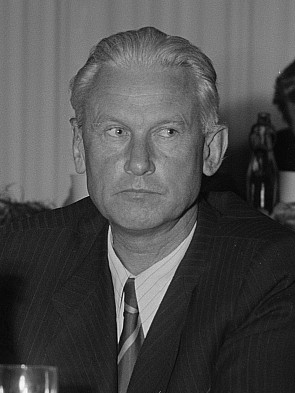Alexander Fadeyev

Alexander Alexandrovich Fadeyev (Russian: Алекса́ндр Алекса́ндрович Фаде́ев; 24 December [O.S. 11 December] 1901 – 13 May 1956) was a Soviet writer, one of the co-founders of the Union of Soviet Writers and its chairman from 1946 to 1954.
Fadeyev was born in Kimry, Tver Governorate. From 1908 to 1912, he lived in Chuguyevka, Primorsky Krai. He joined the Bolshevik Party in 1918 and took part in the guerrilla movement against the Japanese interventionists and the White Army during the Russian Civil War. In 1927, he published the novel The Rout (also known as The Nineteen), in which he described youthful guerrilla fighters. In 1930, he published the first part of the novel The Last of the Udege, on which he continued working the rest of his life (an edition containing the second volume, all he was able to complete, was published in 1940.[1]) In it, Fadeyev intended to show “that an extremely primitive people may experience a leap from tribal communism to the complex collective organization of the twentieth century, skipping over the intervening historical stages: family, private property, slavery, feudalism, capitalism and socialism. […] Uneven though it is, The Last of the Udegs contains some of Fadeyev’s best pages, and the fact that he spent his energies on literary administration rather than on the completion of this novel is a minor tragedy.”[2]
In 1945, he wrote the novel, The Young Guard (based upon real events of World War II) about the underground Komsomol organization named Young Guard, which fought against the Nazis in the occupied city Krasnodon (in the Ukrainian SSR). For this novel, Fadeyev was awarded the Stalin Prize (1946). In 1948, a Soviet film The Young Guard, based on the book, was released, and later revised in 1964 to correct inaccuracies in the book.
Fadeyev was a champion of Joseph Stalin, proclaiming him “the greatest humanist the world has ever known”. During the 1940s, he actively promoted Zhdanovshchina, a campaign of criticism and persecution against many of the Soviet Union’s foremost writers and composers. However, he was a friend of Mikhail Sholokhov. Fadeyev married a famous stage actress, Angelina Stepanova (1905–2000).
In the last years of his life, Fadeyev developed a nervous condition, exacerbated by the prolonged abuse of alcohol. Some sources claim that this was mostly due to the denunciation of Stalinism during the Khrushchev Thaw. He eventually committed suicide by shooting himself in the heart at his dacha in Peredelkino, leaving a suicide note which made clear his negative attitude to both the old and the new leaders of the Party.[3] Fadeyev referred to Stalin as a “satrap” in the note. His suicide occurred after he was denounced by his friend Mikhail Sholokhov; he was also blamed for the poor state of Soviet literature at the 20th Party Congress.[4] In his suicide note, Fadeyev attacked the Stalinists who had “physically exterminated” the best Soviet authors, and said that they had “brought us [writers] down to the level of children; they destroyed us; they threatened us ideologically and called this ‘the Party spirit'”. He attacked the new members of the Soviet leadership, claiming that they were uneducated people who manifested “primitivism and ignorance–along with a disgraceful share of self-assurance” in their attempts to promote Soviet literature.[5]
Fadeyev’s death occasioned an epigram by Boris Pasternak, his neighbor. He is buried in the Novodevichy Cemetery in Moscow.
